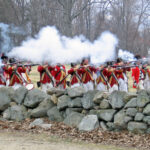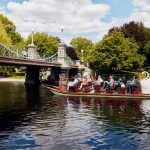From Vietnam to the Streets of Boston: One Family’s Legacy of Service
In one Boston family, a legacy of duty and sacrifice ripples through generations.
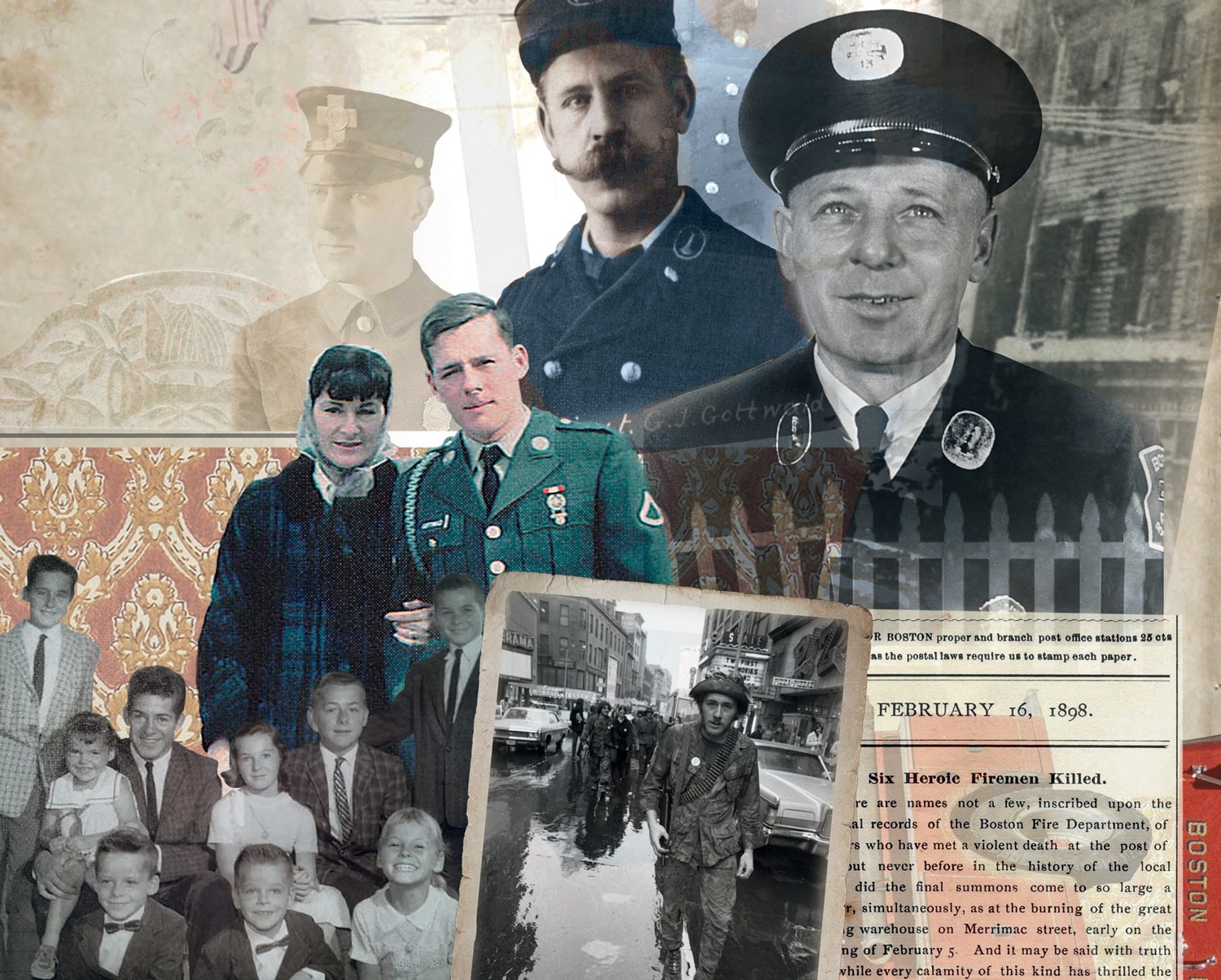
Coffee By Design | Portland, Maine
Photo Credit : Katherine KeenanBy Erin Gottwald
I open up my Facebook feed one day in 2019 and am astonished to find a photo of my father posted in the public group “Old School Boston.” In the picture, my unidentified 22-year-old father is walking down a wet, puddle-filled, pock-marked street. He is stooped, haggard, looking straight into the camera. His face is sunken and shadowed, and a bucket hat sits atop his unkempt hair. He is wearing the army fatigues from his tour in Vietnam from 1969 to 1970. Slung over his torso is an ammunition belt; under his right arm is tucked a replica automatic weapon. The photo is captioned: “Old School Boston … Boston’s Combat Zone … Demonstration … April, 1971 … Vietnam Veterans Against the War.”
It’s a picture of a soldier who returned home.
I’m struck by how ravaged my father looks. Meanwhile, the pictures we have of his brother who was killed in Binh Duong in 1968 feature a handsome, smiling 18-year-old. All the photos of my Uncle George, a year older than my father, were taken before he enlisted in the infantry. George lives on in my imagination as youthful, clean-cut, light-hearted.
Meanwhile, on this computer screen it is my father who looks like the walking dead.
I post a comment under the photo to give the Veteran-Against-the-War a name:
This is my father / Fredrick Gottwald / Served from 1969-1970 / Infantry Rifleman / Machine Gunner / 9th Infantry Division / His brother, George J. Gottwald, died in combat in 1968. My father enlisted after his death. My grandfather, their father, died in the line of duty as a BFD (Boston Fire Department) Lieutenant in March 1970. They are from Roslindale.
The story of Gottwald service and sacrifice started in 1857 when 26-year-old Aloysius Michael Gottwald emigrated from Germany to America. When he was 34 (by then a husband and father), he enlisted in the Massachusetts Infantry of the Union Army. Although impossible for him to foresee, this immigrant set the wheels in motion for his seven children and generations to come. Aloysius was 67 when his son, George Joseph Gottwald, a Boston fire lieutenant, died on February 5, 1898, in the city’s deadliest fire for a single fire company. Aloysius would not be the only Gottwald to survive the death of a son killed in action.
In March 1969, just over a year after my Uncle George died in Vietnam, the corner of Washington Street and Metropolitan Avenue in Boston’s Roslindale neighborhood was dedicated to him: George J. Gottwald Jr. Square. The Boston Globe published an article about the memorial and included what is likely the last family photo of both my paternal grandparents and their eight surviving children. My father left for Vietnam about a week later.
* * * * *
There’s another photograph.
It’s cold, but there’s no snow. My grandmother is long and slender—her nose, her arms, her fingers, everything about her. She stands to the right and slightly behind my father, as though she is pulling him toward her home in the background. It’s 1969, one year after her eldest son was killed in Vietnam. She has a kerchief over the back part of her head and it’s tied below her chin. My dad squints into the lens. He is in the light; she is in his shadow.
Nani’s plaid wool coat is dark. Her hair, almost black. Her eyes, dark. Ivory skin and jet-black features. “Black Irish” they called her. Next to her, Daddy appears broad and muscular in his army uniform. His high-and-tight haircut looks fresh. He has a medal on one of his breast pockets, his name on the other, and a badge on his left sleeve. It’s hard to imagine the Veteran-Against-the-War two years later is the same man.
I think he’s biting his lip.
She grips the crook of his right arm. His hand is tucked into his crisply pressed trouser pocket. Daddy favors his right hip in this picture. They both look at the photographer in anticipation.
The eight concrete stairs behind them lead up to their home at 6 Metropolitan Avenue in Boston. When the army officer came to deliver the news that George was killed in action, my grandfather almost threw him down those stairs; it’s the most violent thing I have ever heard about him. Those stairs led up to a bustling home of nine children, filled with life and loss.
Nani looks like she’s about to drive my dad somewhere. It’s the day he flew to San Francisco. And then to Saigon. But I know she didn’t drive him. And my grandfather, who took the photo, didn’t either. They refused to escort their second-born son to war. He took the bus to Dudley Square. Then the T to Logan Airport.
Many times, my father has described the moments after this photo was taken. He remembers his father on the other side of the screen door, after their good-byes, saying with tears in his eyes, “Freddie, you know you don’t have to prove anything. You’re already a hero.” Those would be the last words he ever said to my dad.
My grandmother is trying to smile in my dad’s shadow.
Like she’s trying to be proud.
Like this is what an American mother does. She loses her loves.
* * * * *
My father enlisted in the army four months after learning his brother was missing in action. After basic training he requested to be sent into combat in Vietnam. The U.S. Army declined his request. So my father slept outside the army offices until they finally agreed.
My father survived his combat tour. He protested the war when he returned to Boston, enrolled in Boston State College. He spent a few years working as a postal carrier, but the monotony was unbearable for this combat veteran. So he took the test for the Boston Police Department. He spent 26 years on the force, retiring in 2009. My father, a natural peacemaker, has led a life surrounded by violent conflict.
I asked him once why it took him so long to get out of the car after coming home from his shift. From the third floor, I could see him under the car’s interior lights, sitting with focus and stillness. And when he came into the house, he’d walk straight to the corner of the kitchen. Every time. Like he was a deer and his pathway a game trail. He’d rise to his tiptoes and deposit the small duffel bag he carried into the 18-inch nook between ceiling and cabinet. Once, he noticed me stalking him. Erin, I’ll show you later. He said this without turning around. Here. His hands cradled the gun.
He wiped down the far end of the kitchen table, away from piles of mail and homework. Sitting across from me, he slid a tiny key into the handcuffs that were locked through the barrel of the revolver. Sounds of metal releasing; the gun was liberated. My dad raised the barrel and examined its five chambers, his pointer finger and thumb coaxing it around. Always check that each one is empty.
He laid the gun down next to my textbooks. I hesitated. I had seen enough. Here, he insisted. It is the only time you will ever hold a gun. I want you to know what it feels like so you never have to imagine it. You won’t hold it again.
I wiped my sweaty palms on my jeans and then held them out. My dad handed me the gun.
* * * * *
My dad once choked on a tuna sandwich. Although my mother and I were sitting at the kitchen table with him, we had no idea he was in trouble. He walked away from us so that he could choke. In privacy.
The door to the back porch was open. That was the giveaway.
“Freddie?”
Silence.
Then: SLAM! The bones of our home shook. SLAM! It was like a car had hit the side of the house. SLAM! We pushed our chairs back and hustled to the back door.
“Daddy?”
“Uuoooohhhhhh …”—his breath staggered and his hands gripped the banister as he hunched over—“… oooffff … uuuuhhh ….”
He closed his eyes, took a deep inhale, and grimaced. “I’m all right. I had to give myself the Heimlich.”
“What?! You were choking?”
“Why didn’t you let us know you were choking?”
“Do you guys know how to do the Heimlich?” He knew the answer. “That’s why.”
He stood up, rolling his shoulders up and back, trying to get to a vertical posture. “But I may have cracked a rib. Nothin’ you can do about a cracked rib. But I’m telling you, if I had died right there: no pension. If I’m gonna die, it better be in uniform.”
His police sergeant uniform, to be exact. Dying on the job was still an option. It was in his bloodline: His father and great-grandfather both died in the line of duty as Boston fire lieutenants. His brother was killed as a soldier in Vietnam.
If you have a job on the front lines, you absolutely do not die choking at your kitchen table.
And you die in uniform.
* * * * *
In 2001, I went to Boston City Hall to get a copy of my birth certificate. Once I made it to the front of a line, I was handed a handwritten note on pink paper and asked to move into the back of another line a few windows down. I was in my early twenties, living in Cambridge, working as a dance program assistant at Harvard. My father was working as a Boston police sergeant, and I would occasionally bump into him around town.
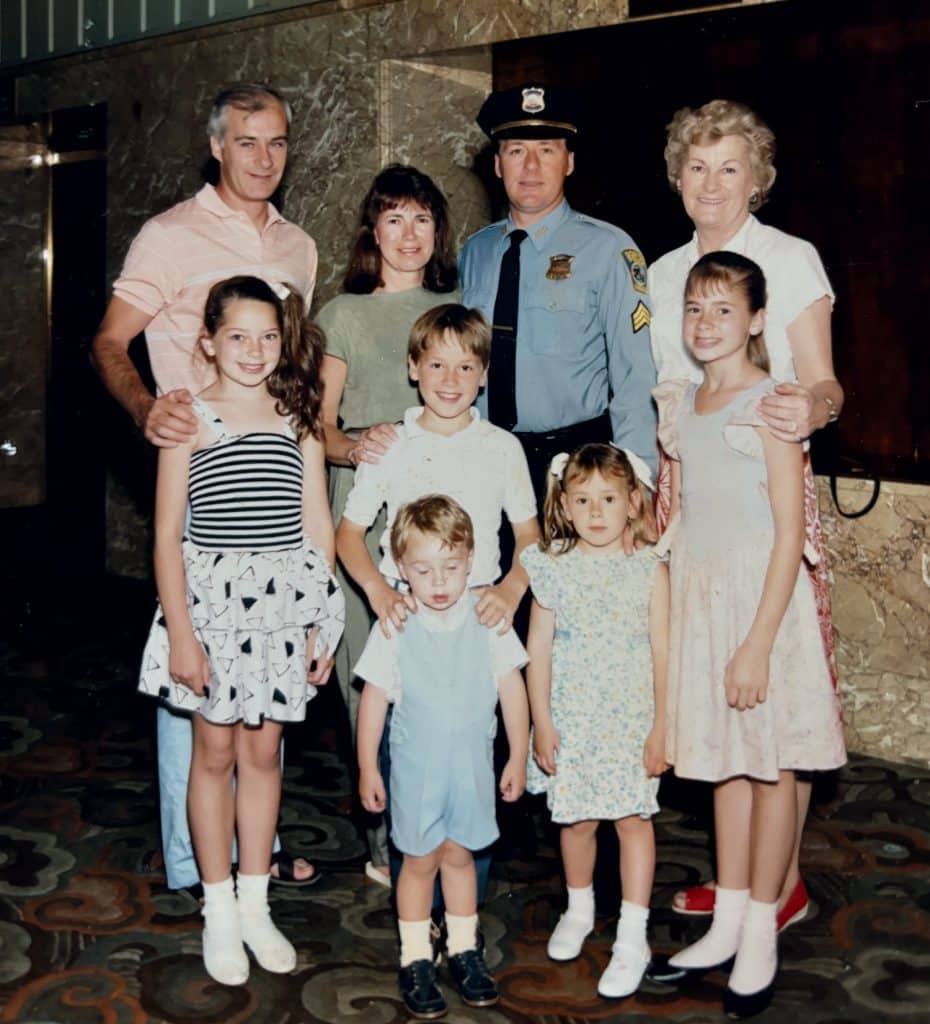
Photo Credit : Courtesy of Erin Gottwald
Standing in line, I noticed parts of uniforms surrounding me: pants of cops, scrubs of nurses, overalls of firefighters. And, for the first time as an adult, I was keenly aware that I was not in uniform in this world that I knew so well. I started thinking about the generations of Gottwalds: my father, my aunt and my uncles, all at their various shifts around Boston.
Behind me, a voice comes from the top of a pair of police slacks.
“Did I hear them say ‘Gottwald’?” He nodded at the plexiglass windows at the front of the line.
“Yeah. Yep.”
“Are you a Gottwald?”
“Yes.”
“Are you related to George Gottwald?”
“He was my grandfather.”
“So, whose daughter are you?”
“Freddie. My dad is Freddie. I’m Erin.”
“Your dad’s a good man, Erin. You come from a great family.”
When I finally had my birth certificate in hand, the off-duty police officer and I said our good-byes. I don’t remember his name. Back then, I had no idea how unusual this occurrence would be. If this interaction happened now, during my middle age, I would remember. If a stranger in line turned to me and was curious enough to ask about my family name, I would want to know about his family, too.
* * * * *
One of the quintessential landmarks of Boston is the massive LNG storage tank that stands proud in its rainbow swash of colors on the Dorchester waterfront. In 1970 there were two tanks side by side, one new and one old. In 1971, artist Corita Kent, an anti-war activist and former nun, was commissioned to paint the rainbow design on the newly erected tank.
But in 1970, two unpainted tanks stood at Commercial Point in Dorchester.
At 1:24 a.m. on January 27, 1970, the Boston Fire Department responded to an emergency at the Dorchester tanks: A young veteran who had just returned from Vietnam had climbed one of them and was threatening to jump to his death. The temperature was well below freezing with wind whipping off Boston Harbor. My grandfather was one of the lieutenants on duty. The fire trucks’ ladders did not reach the top of the 150-foot-tall tank, so he and three other firefighters climbed up the icy iron staircase that wound around the wide cylinder. My grandfather and fellow lieutenant Robert Foley had both lost sons in the Vietnam War, and they sat with this distraught 22-year-old. Ultimately, the young man was carried down and everyone made it back to safety.
As I read the article about this heroic rescue in The Boston Globe, I know things that don’t appear in print. I stare at my grandfather’s smiling face in the photo and understand that it is a rare happy moment in the two years since his eldest son’s death. When George Jr. left for Vietnam, he was in the middle of restoring a ’55 Chevy and left it parked next to my grandparents’ home in Roslindale. My grandfather was seen driving this car around town, sometimes with the windows rolled down, visibly crying as he waited at stoplights. George Jr. had died on a battlefield on top of the medic he was trying to save; his body wouldn’t be recovered for several days, until it was safe. Also not included in print: Fire Lieutenant Gottwald’s second son was in Vietnam.
It was freezing in Boston early that Tuesday. But it was 1 o’clock in the afternoon in Vietnam, and my dad was in combat. Sweltering. And I know that five weeks later, on March 3, my grandfather will die from smoke inhalation fighting a fire.
* * * * *
I’m 11 years old. No streetlights. A dirt road. Packed like sardines in a Dodge Caravan. It’s 1988 and we’re on our final stretch toward our family’s summer getaway at a trailer park in the Lakes Region of New Hampshire. My father is driving. It is late. The youngest of his children are asleep but the oldest three are awake.
My father slows down the car. We can feel the tires ride the pockmarked road. The sound of pebbles crunching under our weight becomes background noise. He rolls down his window and turns off the air conditioner and the radio. He says, Listen. And we do.
He tells us to listen to the sounds of the outside. The wind he says. The leaves he says. The animals he says. We try to hear it all. He tells us to look through the dense woods. He tells us to looks up at the stars. We try. And then he turns off the headlights.
Our eyes adjust to the dark. We put our noses against the windows of the Caravan, those windows that don’t roll down. We can see the outline of trees. We point at the shadows of trees against the night sky. He tells us to look straight ahead. In front of the moving car. Where he is looking. We can’t see anything.
My mom says, Please be careful, Freddie.
Yep, he says.
Imagine being in the jungle like this, he tells us. Imagine the silence. Listen. Can you hear an animal stepping on branches? The crackle? Do you know how many animals are watching us drive down this road? They know we are here. You just can’t see them.
But imagine if someone lit a cigarette way out there in front of us, he says. If a cigarette were lit a mile away, you’d be able to see it. You might not be able to see your hand if you held it in front of your own face, but if you lit a cigarette an animal could see you from a mile away.
None of us breathe for several seconds. He doesn’t tell us that there were human beings in the jungle darkness—other people who were waiting. In New Hampshire, on this summer night, it is only about the animals.
Freddie, turn the lights back on, my mom says. And he does.
We all sit quietly and stare out into the beam of the headlights. We begin to see what he sees.
* * * * *
On March 4, 1970, a military helicopter landed yards from my father’s platoon in a rice paddy in Vietnam. A soldier got out and spoke to the captain. Then the captain approached my father and with one hand on his hip, patted my father’s shoulder with the other. (Over the course of my life, my dad has demonstrated this physical interaction a few times, and it’s always the pat on the shoulder that gets me.)
“Freddie,” the captain said, “ you’re going home. Your papi died.”
My father turned to look him in the eye. “You know, that ain’t funny. Don’t joke like that.”
“I’m not joking. Your papi died. You’re going home. Right now.”
My dad climbed aboard the helicopter in his fatigues. He flew from Saigon to San Francisco in the jump seat. He had no money, no belongings, had not showered, was still caked in dirt and blood from the battlefield. The plane was filled with joyous soldiers who had survived their tours and were celebrating with songs and toasts and laughter. My dad remembers hearing the clinking of beer bottles as he stared out the window. His gaze alternated between the splotches of blood on his uniform and the pale shades of sky outside.
He took a second plane to Boston, and on the sidewalk outside Logan Airport a stranger approached my father, concerned about the despondent, unkempt soldier before him. My father told him an abbreviated version of his journey back home. The stranger told another passerby that my father was the son of “that Boston fire lieutenant in the news.” He whistled for a taxi and told the driver: “Take this soldier anywhere he needs to go.”
My father was supposed to go to his family home in Roslindale, where a suit hanging in the hallway was waiting for him. Instead, he went directly to the funeral home. There he appeared like an apparition in the threshold of the main entrance, in the middle of visiting hours. The room’s somber murmur went silent. Among those who kept their eyes on my father were his mother, his seven younger siblings, and a massive crowd of firefighters. Everyone else looked away.
He stared at his father’s body in the open casket but was unable to enter the room. Until my father appeared in the doorway, my grandmother couldn’t walk unassisted after her husband’s death—her grief too deep and pain too raw. When she saw him, she floated out of her chair and approached her son as though he offered life support. She guided him across the room while onlookers covered their mouths and averted their eyes.
On Halloween 1970, the traffic circle across from Holy Name Church in West Roxbury was dedicated and named Lt. George J. Gottwald Circle.
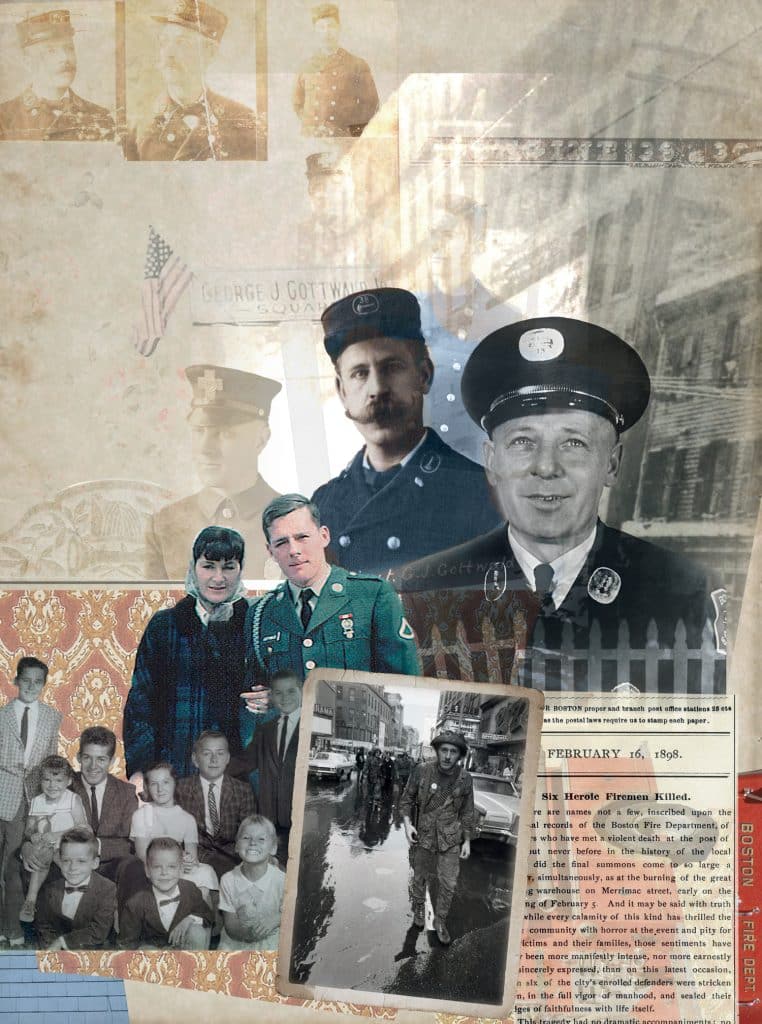
Photo Credit : Photo illustration by Dana Smith
I walk that landscaped traffic circle on a warm, sunny day one January, surprised that the ground had thawed into mud. With my feet sunk into the messy earth, I look over at the church, remembering a story about my grandmother at my Uncle George’s funeral mass there. When the priest offered up the unbroken eucharist, she believed it was on fire. In the depths of her grief, sitting next to her husband, she saw flames. Fiery flames.
On May 16, 2022, a stranger phones my Uncle Eddie, a Boston fire lieutenant, to say he recently purchased an old Boston Fire Department helmet from the Savers secondhand store near Dedham, Massachusetts. “Gottwald” is painted in red under the rear brim. On the front in large yellow block numbers is “22”: BFD Engine 22. This is my grandfather’s helmet from the 1960s. While at Engine 22, he was placed on the BFD’s Roll of Merit, with the citation reading:
For great personal risk involved in the performance of his duty at Box 1541; a fire in an apartment building at 6 Dartmouth Street, South End, on June 21, 1963, crawled through a long hallway and room involved in fire to a rear bedroom and removed a child he found in an unconscious condition. Firefighter Gottwald performed this rescue under most difficult conditions before ventilation of building or hose lines were in position. He is hereby placed on the Roll of Merit.
The day he crawled to that unconscious child, he was a father of nine—the youngest 2, the oldest 15. He returned home to them that day.
The stranger drives the helmet to Uncle Eddie’s home. A piece of my grandfather returns to our family.
* * * * *
My 8-year-old daughter asks me why my last name is different from hers. She is perplexed. I tell her I was born a Gottwald. I tell her I have my daddy’s last name just like she has her daddy’s last name.
She squints her eyes at me as she absorbs this information.
My two married sisters also are Gottwalds. Our name has always defined us as part of a working-class Boston family. Like the moon was once part of Earth, we remain Gottwalds because it is our family of origin. Our clan that has a gravitational pull.
I wonder if people read the names on the signs at traffic circles and corner squares. Are they curious about these George Gottwalds? I want to tell them about what our family has sacrificed. I want to tell them about the Boston Gottwalds who gave their lives to save others.
I once volunteered for my daughter’s school field trip to FDNY’s Engine Company 226 in Brooklyn, where we now live. I had never been to a fire station where I was anonymous. I thought it would be a chance to plant the seeds of family history in my daughter. But instead of watching the kids burst with glee as they saw one of the firefighters slide down the shining silver pole, I lost myself in the glass cases at the back of the station. Behind the windows were memorials to four of the fallen: turnout jackets printed with the names Wallace, DeRubbio, McAleese, and Smagala, alongside pictures of spouses, children, and grandchildren they never knew.
I confided in the lieutenant, saying, “My grandfather was killed in the line of duty in Boston. These memorials are beaut—” And I choked on the last syllables as I looked at him.
As I’m sure he had done dozens, perhaps hundreds, of times before, he put his hand on my shoulder and said, “I’m sorry for your family’s loss.” It was the first time a stranger had acknowledged the indirect yet profound loss I had always felt. The sort of loss that ripples down a family line.
The FDNY lieutenant caught me off guard. The rest of what I wanted to say was lost to the lump in my throat. What I wanted to say was that when my grandfather died on Washington Street in Boston, he saved his son’s life in Vietnam. My father was plucked out of combat and returned home on March 4, 1970. And my father’s mantra on his journey from Saigon to Boston was march forth: “March 4th. I will march forth. That’s how I will get through this. I will march forth.”
So he did. So I am here.
My grandfather died six years before I was born.
My father marched forth.
And fire gave me life.




